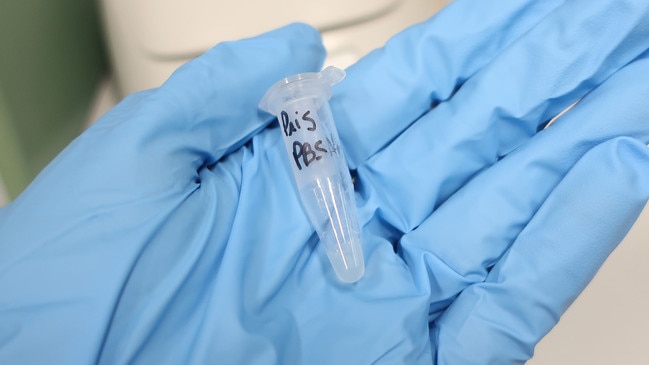New antibiotic from RMIT could be the ultimate superbug resistor
Melbourne researchers behind Priscilicidin say the threat of antimicrobial resistance is as big as Covid, with their new invention potentially offering a cheaper, more effective antibiotic.
A new antibiotic poised to treat stubborn microbial pests such as bacterial and fungal infections has been developed in Melbourne, with the drug offering a potentially cheaper, more aggressive alternative to conventional antibiotics.
The new and improved antibiotic, Priscilicidin, can be rapidly re-engineered to avoid resistance by dangerous superbugs, and in tests was shown to be highly active against golden staph, e.coli and candida fungi.
Developed by RMIT’s Priscila Cardoso, after whom the antibiotic is named, and principal supervisor Celine Valery, Priscilicidin is said to have a simple design, meaning the potential medication is cost-effective and can be made quickly in a lab.
Dr Valery insisted the antibiotic be named after the PhD candidate because of her contributions to the project and for being a “fantastic student”.
The antibiotic is made up of four amino acids from the natural antibiotic peptide Indolicidin, found in the immune system of cows; it works by disrupting the cell membrane of microbes, eventually killing unwanted cells.
School of Science professor Charlotte Conn, who supervised the research, said developing a new natural class of antibiotics was vital, given products in the market losing their effectiveness.
“Antimicrobial resistance is when bacteria are no longer killed by the antibiotics we have available … which is a frightening place to be because if we don’t develop new antibiotics, we almost go back to a pre-antibiotic age where you could die from an infection you pick up in hospital,” Professor Conn said.

“It really opens up a new class of antibiotics – that’s absolutely critical if we are going to treat antimicrobial resistance, which is a threat at least as big as Covid.”
Priscilicidin has an edge over existing antibiotics in that it is based on natural antibiotic peptides, meaning it is less likely to cause antimicrobial resistance compared to standard antibiotics.
While more effective, antimicrobial peptides are usually more expensive to make, as extraction from a natural source is required.
By using only fragments of the peptide, Priscilicidin could bypass hefty operational costs.
The antibiotics properties make it ideal for gels and creams, but its formulation is up for experiment, with oral administration also a possibility, Dr Valery said.
While Priscilicidin’s development is in its early stages, Professor Conn confirmed that plans for animal trials were in place.
“We’re very confident about taking this technology forward,” she said.
“I’m sure that it will lead to a really exciting product in the market.”






